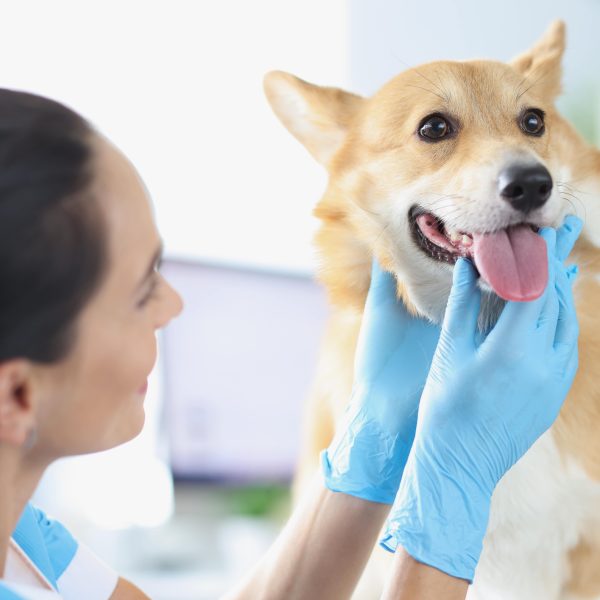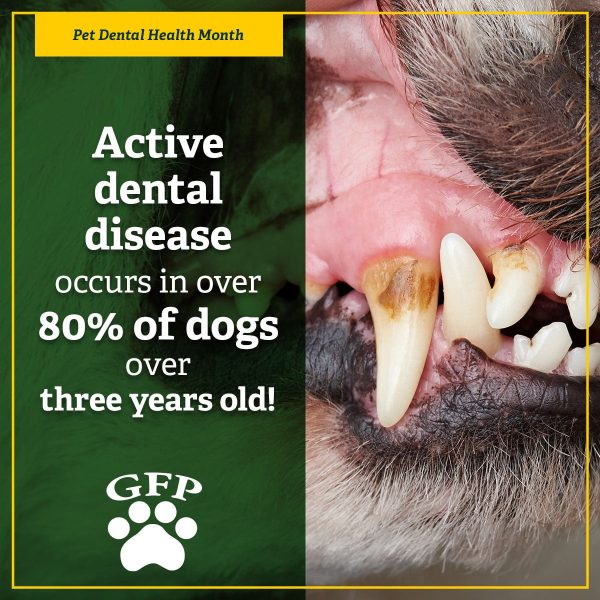Why is My Dog’s Face Swollen?

It can be concerning if you notice that your dog’s face is swollen. It can indicate underlying issues that most likely will need medical attention. If you ever have to ask, “Why is my dog’s face swollen?”, being able to identify the reason can help you determine the next best steps. Here are a few potential reasons your dog’s face is swollen and what you can do to help:
4 Potential Reasons Your Dog’s Face Is Swollen
If your dog has a swollen face, it’s often due to an underlying medical issue or reaction to a specific cause. These are a few potential reasons your dog’s face is swollen:
1. Allergic Reaction
Allergic reactions are a fairly common skin problem in dogs and can cause swelling in the area that is affected or in a completely different part of the body. If the facial swelling is sudden, it could be because of an allergic reaction or an inflammatory reaction. While some of this facial swelling might not be serious, it should still be checked out by your veterinarian just in case.
Common Allergies That Can Cause Facial Swelling in Dogs
The most common typical allergies that affect dogs and may cause facial swelling include:
- Dust or mold
- Certain medications
- Pollen or other plants
- Insect bites or stings
- Certain foods
- Other environmental allergies
Signs of Allergic Reactions in Dogs
Depending on the severity of the allergy, the signs of allergic responses in dogs can include:
- Hives
- Facial swelling
- Swelling around the eyes
- Skin redness
- Itchiness
- Diarrhea
- Vomiting
- Weakness
- Pale gums
- Anaphylactic shock
If your dog experiences an allergic reaction to any of these triggers, they may experience hives or swelling, especially in the facial area. You may also see some swelling around the eyes, red skin, or notice your dog is so itchy.
These reactions can come on quickly and become worse, sometimes causing diarrhea or vomiting, pale gums, or weakness. They may also experience anaphylactic shock. If your dog experiences any of these symptoms, make sure to call your vet immediately.
For more serious reactions, go to the emergency vet as soon as you can. If your dog is experiencing an anaphylactic reaction, it is an emergency, and they should be taken to the nearest veterinarian hospital as soon as possible.
2. Dental Issues
If your dog has any dental-related issues, they may experience some swelling in their face. Periodontal disease, or gum disease, might cause facial swelling, so be sure to have a vet examine your dog’s teeth and mouth. Other issues, like infections or abscesses of the gum or tooth, will cause facial swelling. Oral injuries, like a broken tooth or if your dog has a loose tooth, may also cause swelling.

3. Trauma or Injury
If your dog experiences any injury to the face or head, facial swelling is often a common symptom. If your dog is bitten by another dog or animal, the area may get infected, causing swelling.
Your dog’s face or muzzle is a common location for snake bites, which often cause swelling. If your dog was chasing or sniffing at bees, or if your dog ate a bee, and they are stung inside their mouth or on their muzzle, you’ll see facial swelling as a reaction.
4. Tumors
Any abnormal growth in the head will cause swelling. As these growths spread, they can cause damage to the facial structure, nerves, and muscles. This will cause pain and swelling. Cysts, which are a type of lumps on dogs, are growths filled with fluid, and can also appear on the face, leading to facial swelling. Certain kinds of cancer may also cause facial swelling if located in or near the head.
How Vets Determine the Cause of Facial Swelling in Dogs
If you notice that your dog’s face is swollen, you should schedule an appointment with your veterinarian. They will ask you about any activities your dog has recently been involved in or any new medications or substances they may have come in contact with. They will also ask if your dog has any known allergies.
Some things veterinarians can use to diagnose the cause of facial swelling in dogs include:
- Initial exams
- X-rays
- Skin scraping
- CT scans
- MRI scans
Once the initial exam is complete, they may recommend more testing, such as X-rays. X-rays can look for tumors or periodontal disease, as well as other oral injuries. Sometimes, vets will preemptively prescribe medications, like antibiotics, if an abscess is suspected. If the medication works, this can help your vet determine a diagnosis of the swelling.
If an allergic reaction is suspected, your vet may do a skin scraping. These skin cells will be analyzed at a lab to help determine what exact allergen is causing their reaction. Skin scraping can also be used to test for certain tumors of the skin of the head.
CT (computed tomography) or MRI (magnetic resonance imaging) testing is sometimes used to diagnose facial swelling as well. This is often used when cancer or dental disease is suspected. It may also be used if your dog has experienced a facial injury.
How To Treat Facial Swelling In Dogs
The treatment of facial swelling will depend on what is causing the swelling. Some mild swelling might clear up on its own, but you still should check with your vet just in case. Even mild swelling might indicate an issue that might become a bigger problem down the road. Catching it early might make a big difference in a better prognosis.
Dental
If the swelling is because of dental disease, there are a variety of treatments that might be recommended. Sometimes, more regular dental cleanings at the vet for periodontal maintenance will be recommended to keep your dog’s teeth and gums healthy. In other cases, tooth removal might be the best solution.
Abscess
In the case of an abscess, antibiotics will treat the infection and reduce swelling. Depending on how bad the infection is, your dog may require another round of antibiotics or even a different type of antibiotics. Your veterinarian will schedule a follow-up appointment just to make sure everything is clearing up as it should be.
Allergies
In the case of allergic reactions, there are different types of treatments to try. These often depend on how bad the allergic reaction is and the cause. Most often, an anti-inflammatory drug is used. Sometimes, your vet may prescribe an over-the-counter medication that is safe for dogs, like an antihistamine, to manage the reaction. In very severe cases, intravenous fluids might be provided.
Bites, Other Injuries, or Cancer
If the swelling is caused by an insect or snake bite, it will depend on the type of bite. With something like a snake bite, you want to make sure you get to an emergency vet in case it causes a serious reaction. If the bite is from a venomous species, your vet will need to determine exactly what treatment is necessary.
If another type of injury or cancer is causing the swelling, your vet may prescribe an anti-inflammatory medication to help treat the swelling, while also working on addressing the underlying cause. In some cases, pain medication will be prescribed as well.
How to Prevent Facial Swelling in Dogs
While it’s impossible to prevent every possible cause of facial swelling in dogs, you need to be aware of what might be a potential cause. If you know the causes, you can put some preventative measures in place to protect your dog. Here are some ways to prevent facial swelling in dogs:
1. Avoid Things That You Know Cause an Allergic Reaction
If you know that your dog is allergic to something, try your best to keep them away from that specific allergen. This also goes for any known reactions to medication or vaccines. You can ask your veterinarian for advice, and they may prescribe something to minimize the reaction in advance.
2. Prioritize Your Dog’s Dental Health
To avoid dental issues, good dental care for dogs makes a big difference and is important. If you don’t already have a dental care routine, it’s a good idea to start one. Good dental care early and consistently throughout your dog’s life can help prevent dental problems and other issues, like periodontal disease, later in life.
3. Take Precautions to Reduce the Risk of Injury
In order to prevent most traumas, don’t let your dog roam free in a non-fenced area. If you are in a non-fenced area, be sure your dog is on a leash at all times. If your dog is playing with another dog or animal, make sure to supervise in case you need to step in to prevent injury. Close supervision is a dog park etiquette tip to make sure you follow. If any trauma occurs, be sure to contact your vet for advice.
4. Keep Up With Regular Vet Visits
Facial swelling caused by tumors or cancer is not always preventable. However, the sooner you seek treatment, the higher the chance your dog will have a good prognosis. Keeping up with regular vet visits and contacting your dog for anything concerning you see with your dog can help you catch anything that might be starting to happen early.
So, if you’re wondering, “Why is my dog’s face swollen?”, the answer may not necessarily always be straightforward. However, with some help from your veterinarian, you should be able to find the underlying issue and help your dog feel better!
